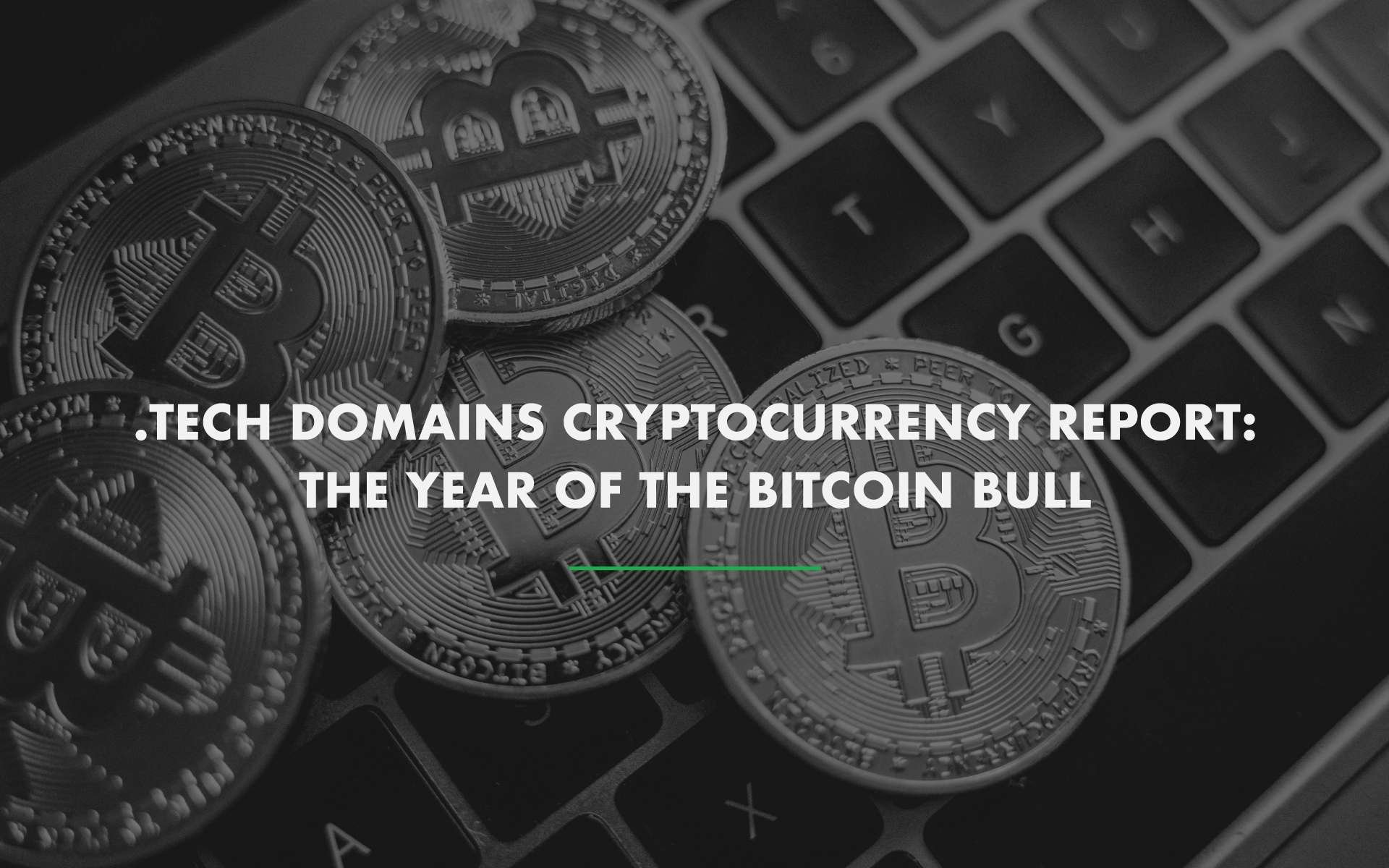In just a little more than a decade since its inception, bitcoin has gone from an esoteric tool for internet rebels to a coveted investment vehicle for some of today’s biggest investors and financial institutions.
And with business luminaries such as Elon Musk (who recently tweeted that Tesla vehicles can now be bought using Bitcoin) and Mark Cuban openly acknowledging their support of, and investment in cryptocurrencies, as well as institutions like PayPal and Venmo opening their platforms to them, the train towards mainstream adoption has officially left the station.
Greasing the tracks even further, bitcoin’s parabolic move from $5,000 to $60,000+ in just one year has made it simply impossible for the world to ignore cryptocurrencies.
With all of this in mind, the team at .Tech Domains wanted to dig deeper into the views and behaviors of today’s retail crypto investors — as well as those who aren’t yet dabbling in digital money — to get a better understanding of the cryptocurrency tsunami currently washing over the globe.
To do so, we commissioned a study in March to more than 1,000 Americans, and here’s what we found.
Falling Trust Fuels the Rise of Cryptocurrencies
It’s no secret that society has been steadily losing trust in governments and institutions over the last several years. Edelman’s most recent Trust Barometer found that only 52% of the population say that they trust businesses in the financial category, down from 56% in 2020.
Our findings support this with 65% of Americans saying that they only “somewhat” trust the traditional financial system and only 17% reporting that they have a “high” level of trust in it.
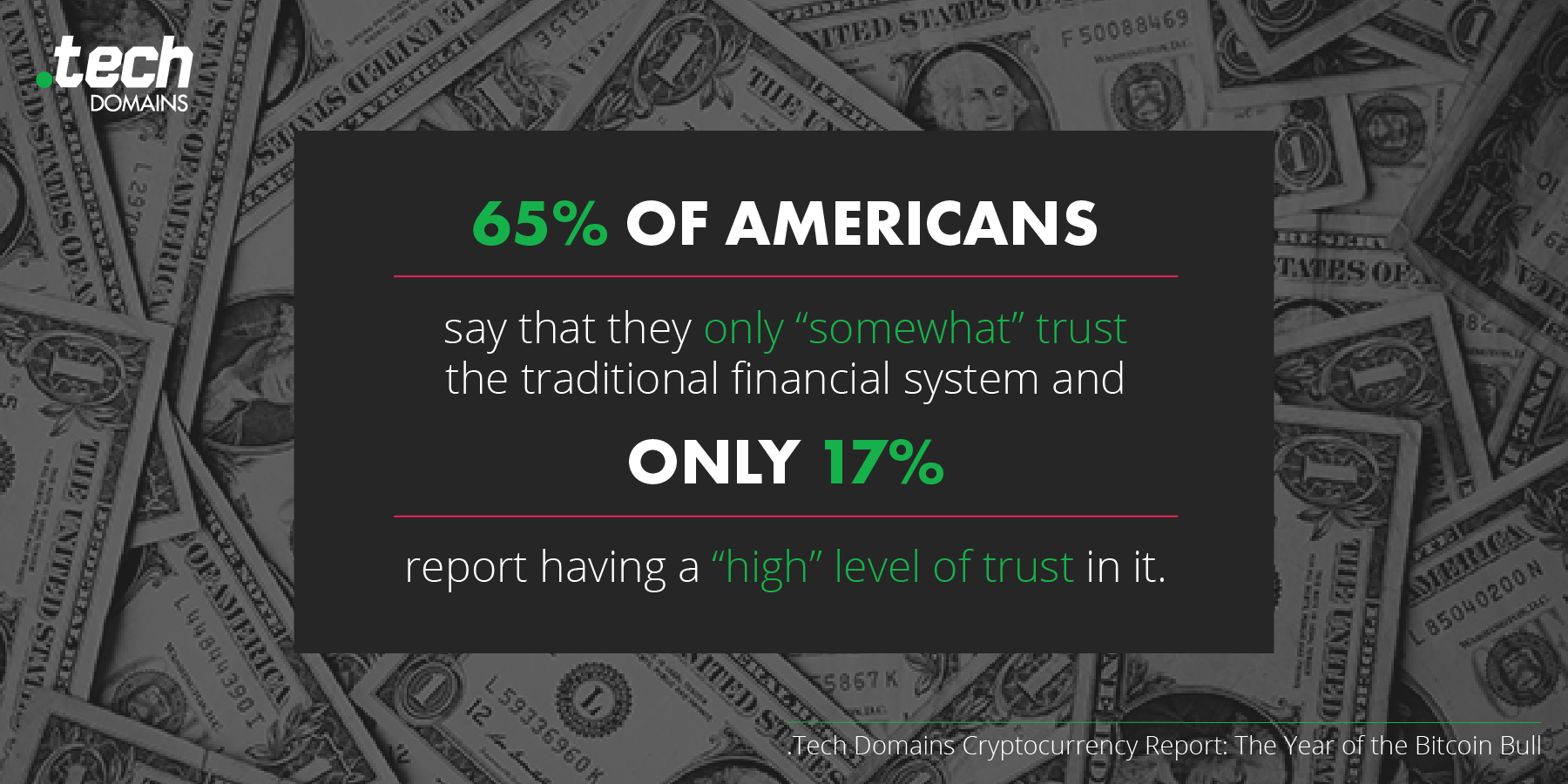
While this isn’t a new trend, we’ve seen this distrust and disdain manifest in new ways recently, including in Reddit forum WallStreetBets’ antagonistic trading tactics that led to struggling stocks such as GameStop and AMC Entertainment Holdings seeing unimaginable rises and institutional traders on the other side taking massive losses.
What’s followed has been what many perceive to be a blatant example of institutions swooping in to protect the interest of their well-heeled counterparts without regard for the average investor.
Adding fuel to the distrust fire for many is the government’s economic response to the Covid crisis. To date, the US government has spent $5.5 trillion dollars in stimulus relief. And while it’s impossible to deny the financial needs of millions of individuals and countless businesses, even some of today’s brightest economic minds believe that these efforts are simply a bandaid that could lead to longer-lasting issues such as hyperinflation.
Suffice to say, the events of the past year have ushered in the perfect storm for cryptocurrencies and provided trillions of new reasons for its champions to expound its deflationary and decentralized properties.
Indeed, for many believers, bitcoin and other cryptocurrencies have become a “life raft” floating amidst the unprecedented macroeconomic environment society finds itself in.
Digital Natives Going All in on Digital Dollars
According to our findings, 26% of Americans are currently invested in cryptocurrencies, with males more likely than females to be in the market (31% vs 21%).
Compared with past studies, the number of Americans who own cryptocurrency has nearly doubled since 2020, when studies revealed that 15% owned some form of crypto.
Interestingly, past research has also found that men owned crypto at nearly twice the rate as women, meaning our findings highlight an accelerated interest amongst women when it comes to owning crypto.
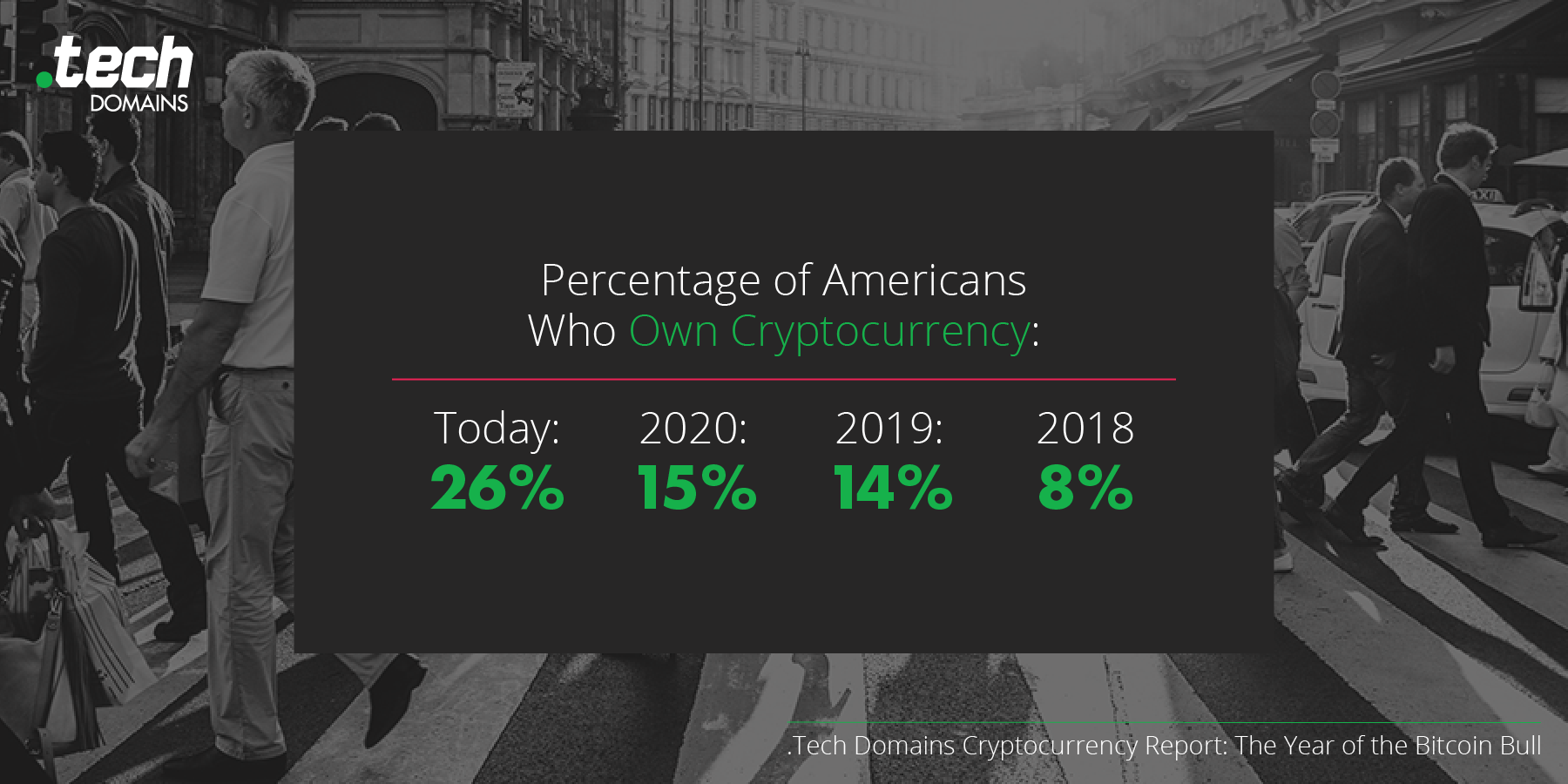
One can only speculate the reasons why, but it seems that the growing awareness around the market is playing a part. After all, studies show that women perform as equals at, if not better than, generating a return on investments compared to their male peers.
Perhaps lockdown — as well as the number of high-profile influencers spreading the word about cryptocurrencies — has inspired women to take their investing prowess skill set to the crypto space after years of being significantly underrepresented.
Meanwhile, Millennials and Gen Z are the most heavily represented generations with 42% and 46% respectively saying that they are currently invested in the market.
What is somewhat surprising however is the extent to which these younger generations are going ‘all in.’ 42% of millennials who are investing in cryptocurrencies say that they have invested 25% or more of their total net worth into this technology.
With some of the most ardent institutional supporters recommending that those seeking exposure to crypto invest 1%-5% of their total portfolio, an allocation in excess of 25% is significant.
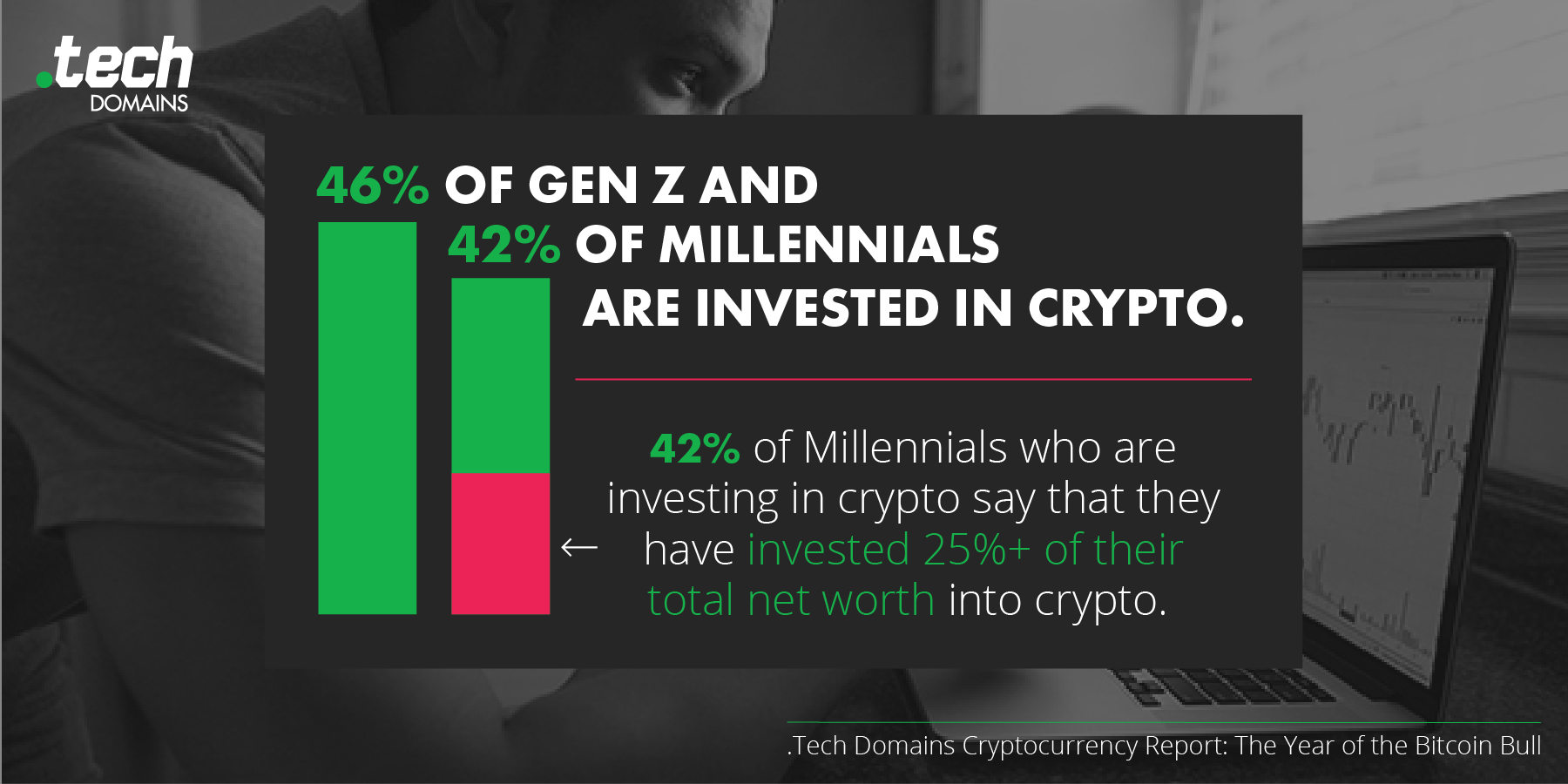
However, when considering past trends of Millennials fleeing traditional markets and seeking alternative investments, their extreme bullishness becomes more clear. It could be that many in this generation view bitcoin and cryptocurrency as the only way to climb out of the economic holes they’ve found themselves in.
And while bitcoin has been commanding most of the headlines, it’s far from the only crypto attracting investments. With literally thousands of cryptocurrencies to choose from and a market size north of $1 Trillion, there’s a lot of options for investors.
The top two crypto investments respondents reported were Bitcoin (65%) and Dogecoin (39%), illustrating both the power of the first mover and the Internet meme. Rounding out the top five are Ethereum (33%), Bitcoin Cash (32%), and Litecoin (26%).
Making Money & Breaking Preconceptions
So what exactly is driving people to these digital investments? Not surprisingly, the top reason was “To make money.”
With bitcoin’s headline driving price rise and the parabolic action that many other cryptos have been seeing as of late, it’s only natural that many are hoping to enjoy the type of returns that have been responsible for minting upwards of 100,000 crypto millionaires.
The second most common response was “The technology’s ability to provide more financial access and equality for the world” (42%) followed by “It’s fun” — illuminating the thrill-inducing rollercoaster action that the markets have provided over the last few months.
For crypto detractors and skeptics, a common argument against the validity of the technology is that those investing in it are simply young, uninformed gamblers looking for a get-rich-quick scheme. However, our findings show evidence of a contrarian picture.
Only 17% of those who rate their understanding of financial and economic topics as “average” or “poor” are currently invested in the cryptocurrency market which would suggest that bitcoin and its crypto cohorts are not simply a magnet for the uninformed.
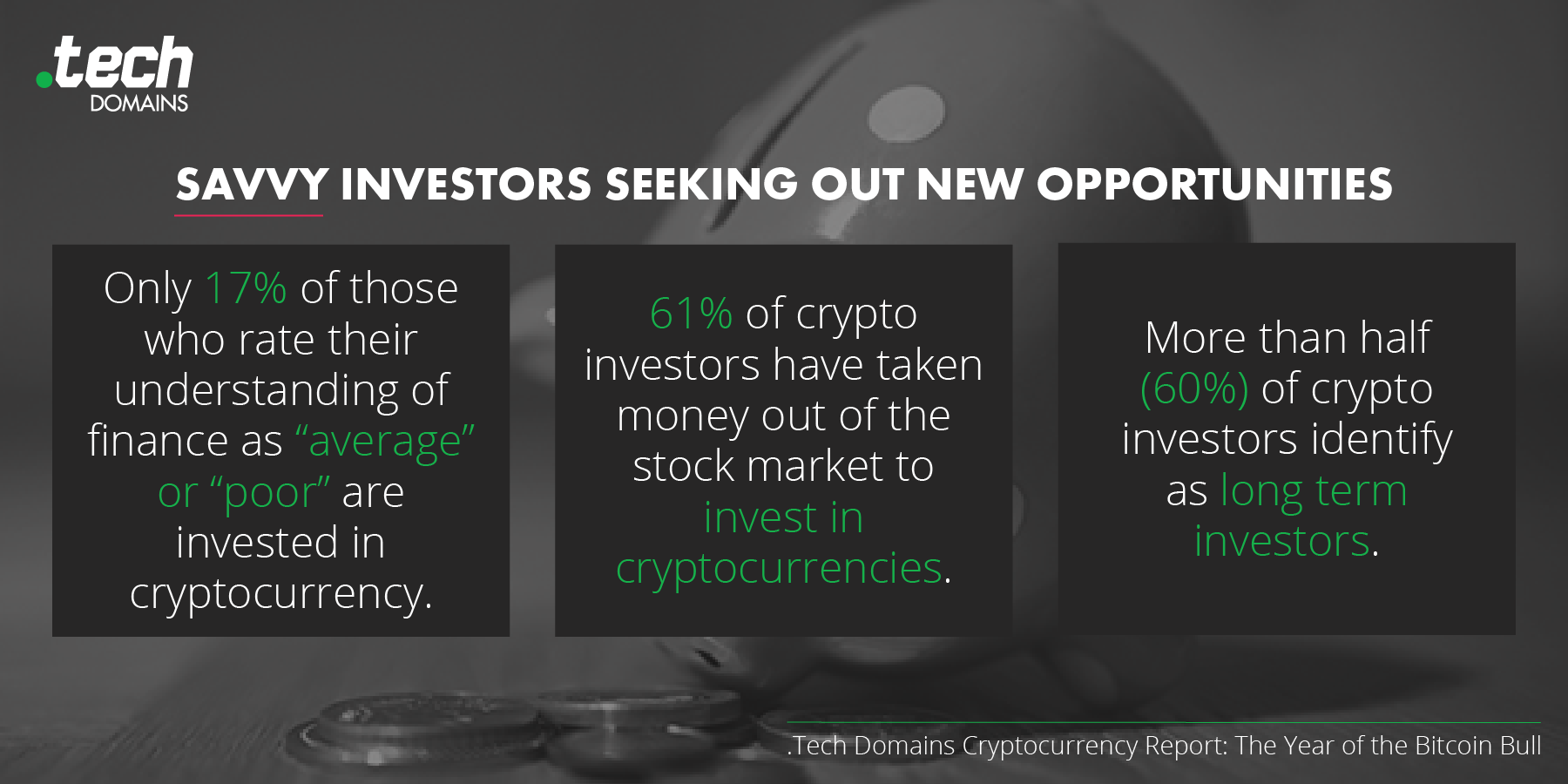
Further, 61% of crypto investors say that in the past year they have taken money out of the stock market or other traditional investments to invest in cryptocurrencies.
This can be seen as both a potential confirmation of the pervasive lack of faith in traditional finance, as well as evidence that the majority of crypto investors have at least some prior investing experience.
Why is this important? These findings suggest that the majority of crypto investors have had exposure to traditional markets and are not simply throwing money at a shiny new object without an understanding of how investing works.
On a bit of a side note, it’s also interesting to see that only 15% of those who say that the fallout of Covid-19 has not impacted them financially are invested in cryptocurrencies, yet 49% of those who say they have been “greatly” impacted are.
While one could argue that this is a signal that these folks are desperately looking for a way out of their financial woes, it could also be seen from the analogy that most people don’t seek flood insurance until after they experience a flood.
Taking Passion to a Whole New Level
The term “enthusiast” doesn’t do justice to the vast majority of crypto supporters and investors. One visit to #CrytpoTwitter is all it takes to see the extreme fervor echoing across the digital sphere as supporters vehemently debate detractors of the technology in general, as well as supporters of other cryptos not so affectionately referred to as “Sh!?T coins.”
But as with any new technology or innovation, it takes unrelenting passion from early adopters to help push it mainstream. When it comes to crypto, however, passion seems to border on obsession.
57% of crypto investors say that they check the price of their investments more than once a day, with nearly one-third (30%) saying that they check more than three times daily.
While this may be due in part to the fact that our phones give us instant access to this type of information, long term investors — which more than half (60%) of crypto investors identify as — are recommended to only check their portfolios on a monthly basis, at most.
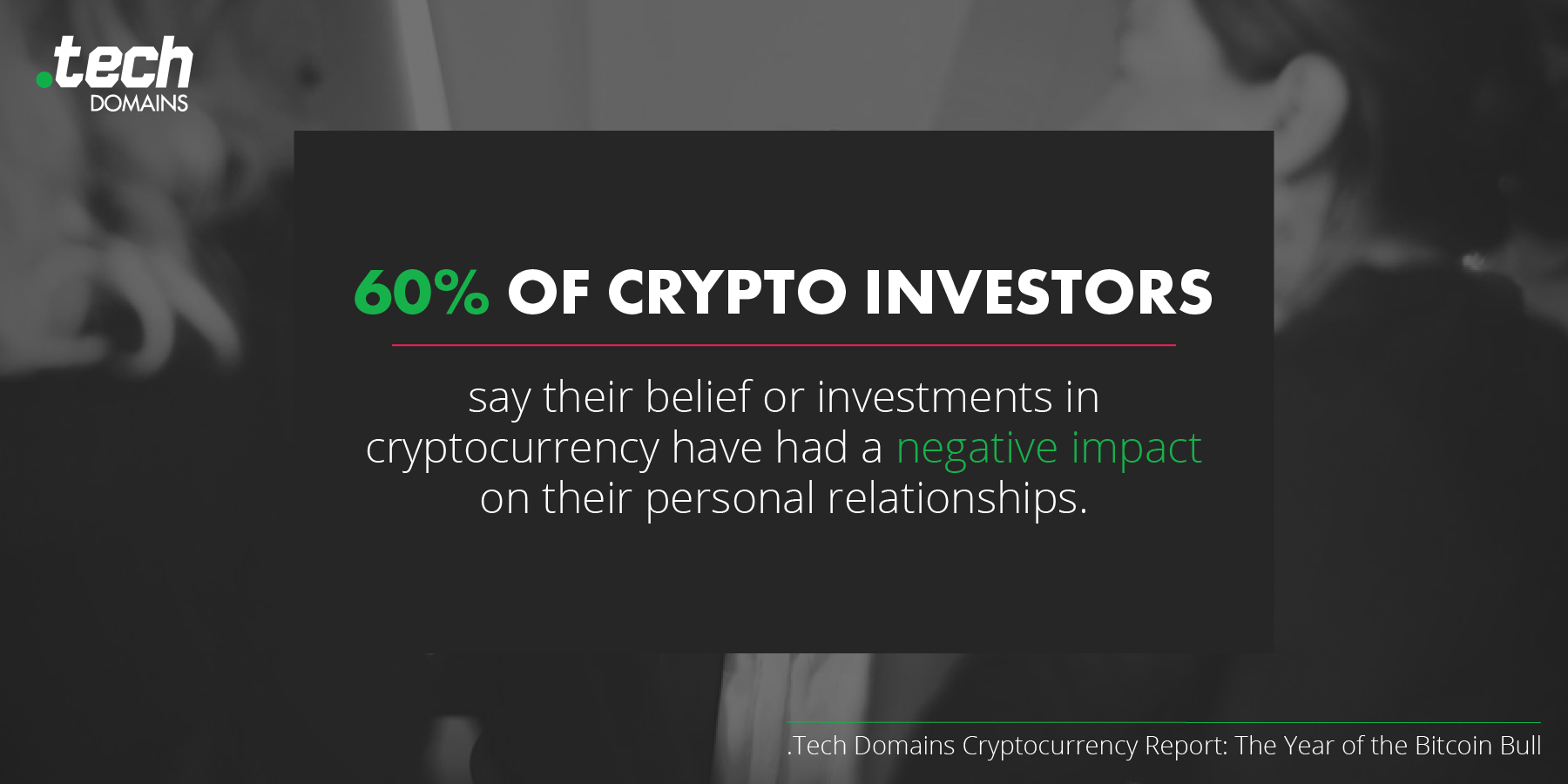
And while there might be no harm in checking in on investment more frequently, it appears that being in the crypto market does come with very real consequences for many. In fact, 60% of crypto investors say their belief or investments in the cryptocurrency have had a negative impact on their personal relationships.
With countless stories of people selling homes and businesses to invest in crypto and the sheer polarizing nature of the topic, perhaps it’s not surprising that so many crypto investors have experienced strain on their personal relationships.
‘No-Coiners’ Aren’t Ready to Write Crypto Off
Now that we’ve looked deeper into the mindset of the crypto community, let’s take a look at those on the outside.
The most common reason why people aren’t invested (59%) is “I don’t know much about it” followed by “I don’t believe in it” (26%,) and lack of regulation (25%). It’s interesting to note that only a quarter of those who aren’t in the crypto markets say that it’s because they don’t believe in it.
Despite where you stand on arguments such as where its value is derived from or whether the market is simply a bubble akin to the Tulip Mania of 1637, with bitcoin having next to zero downtime since its inception and impressive innovations underpinning many cryptocurrencies, it’s hard to simply shrug off the technology as vaporware.
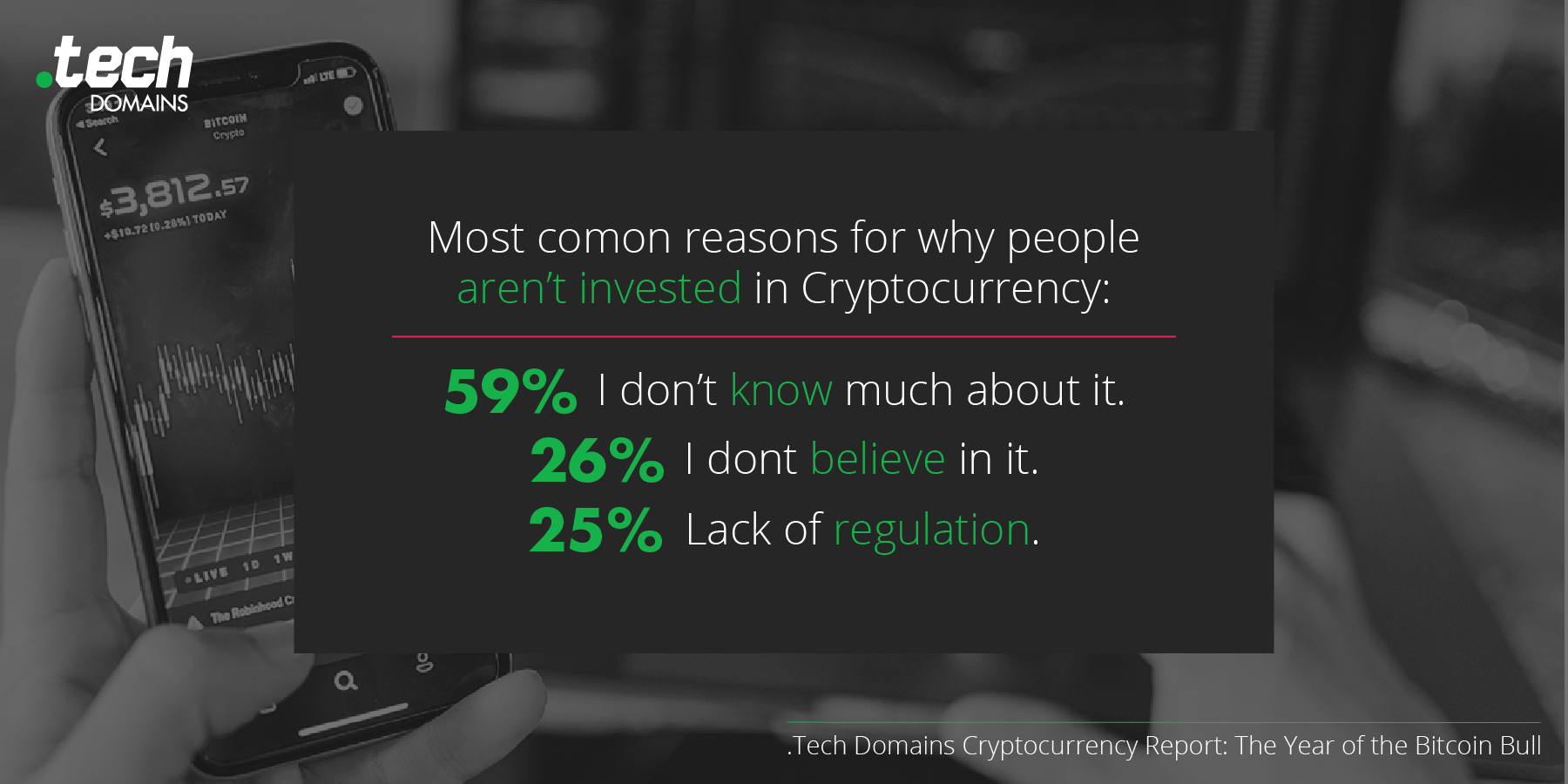
Further signaling the decline in pure non-believers is the fact that 31% of those who aren’t invested in crypto believe that bitcoin will end the year above $50,000. Only 18% said they believe Bitcoin will finish the year under $50,000, while 51% of no-coiners said they weren’t sure.
As to what it would take to convert those who’ve not invested up until this point? The top events were “Cryptocurrencies being accepted by major brands” (22%), “Recommendations from my financial advisor” (21%), and “Governments embracing them” (15%).
While financial advisors and governments are still very much in the education and evaluation mode, with the likes of Tesla recently announcing that people can now use bitcoin to buy their cars, one can only assume that we will continue to see new entrants entering the market.
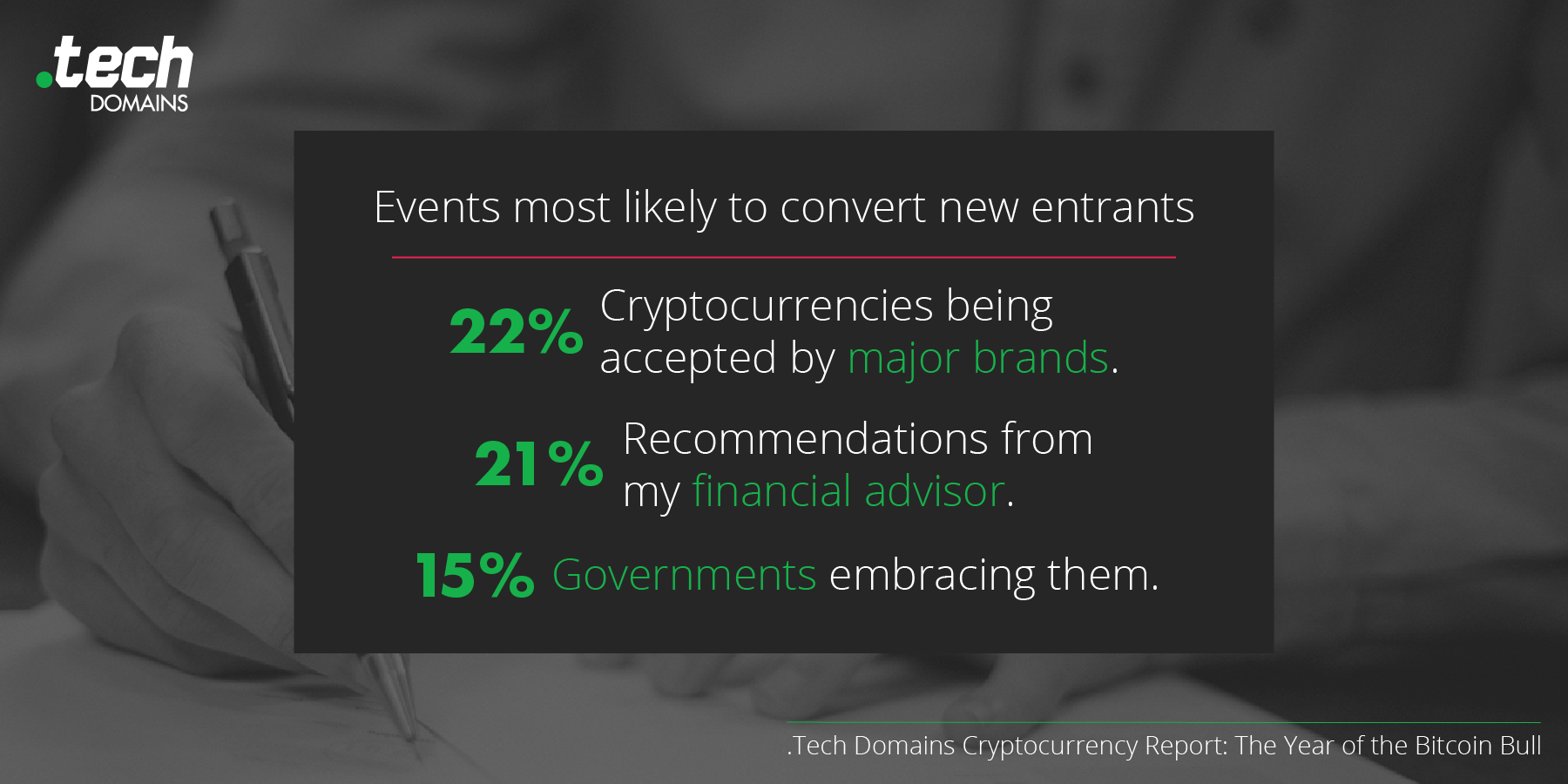
Looking Ahead
With a backdrop of distrust for legacy systems and an economic crisis continuing to push people towards seeking out new ways to preserve and build their wealth, it seems as if the perfect storm is brewing for cryptocurrency adoption. And while bitcoin and its counterparts have indeed come a long way, there are still many miles to go.
With its newfound spotlight, the technology now faces a new test of winning the favor of governments and regulatory bodies. While one can argue that technologies like bitcoin can to some degree circumvent these things, there’s no question that mass adoption will be more difficult if crypto finds itself in the crosshairs.
We’d be remiss to not include what bitcoin bulls think their coveted coin will be worth by the end of the year. Most respondents said that it would be somewhere between $50-100,000, and an additional 34% believe it will be worth $100,000.
